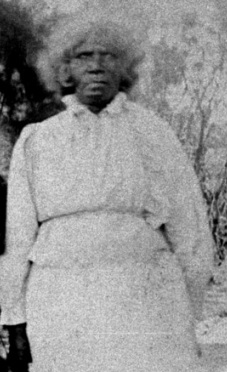FANNY BALBUK YOOREEL
 Courtesy: Battye Library [25341P]
Courtesy: Battye Library [25341P]
Fanny Balbuk Yooreel was born at Matagarup in 1840. She was the granddaughter of Yellagonga. Her father was Coondebung. Joojeebal/Doodyeep was her mother. Joobaitch was her uncle.
Fanny Balbuk witnessed the devastation of her traditional lands by the early Swan River Colony. She would walk through the area of the city of Perth, naming every feature and tradition of the land and recall the part played by her mother and grandmother in the kangaroo hunt at King’s Park.
She gathered zamia fruit on St Georges Terrace. In the 1890s, Perth’s railway station was built on the swamp where she gathered eggs and caught turtles and crayfish.
However, Fanny Balbuk was adamant to stick to her traditional rights of way. On finding that white men had built houses, and laid fences, on her traditional land, she would break down the fence, or walk right through any house and yard that had been built in the way.
Daisy Bates wrote of Fanny Balbuk at the time;
"To the end of her life she raged and stormed at the usurping of her beloved home ground. ….. Through fences and over them, Balbuk took the straight track to the end. When a house was built in the way, she broke its fence-palings with her digging stick and charged up the steps and through the rooms."
Balbuk’s grandmother, Moojorngul, is buried in the grounds of Government House, or Kooraree. Balbuk never let the settlers forget whose land they had taken. She would stand at the gates of Government House - where her grandmother's burial ground lay - cursing those who lived inside.
In 1907, Fanny Balbuk attended a luncheon at the Karrakatta Club, an exclusive club for women in Perth. Daisy Bates introduced Balbuk to all present as their landlady, since she was the original owner of the land on which the club stood.
The information which Fanny Balbuk gave to Daisy Bates about the traditional Nyoongar lands in the Perth area, played an important role in the Native Title claim of 2006, when Justice Wilcox of the Federal Court of Australia found that Nyoongar people held Native Title rights over the Perth metropolitan area and its surrounds. This was the first occasion when native title had been found to continue to exist in an Australian capital city.
The Nyoongar Tent Embassy proposes that the name of The Causeway be changed to Fanny Balbuk Way, to honour the spirit of this remarkable woman and to proclaim the traditional owners of the land.
If anyone has any more knowledge on Fanny Balbuk, please pass it on to the Nyoongar Tent Embassy so that we can complete the information we have gathered so far.
Fanny Balbuk witnessed the devastation of her traditional lands by the early Swan River Colony. She would walk through the area of the city of Perth, naming every feature and tradition of the land and recall the part played by her mother and grandmother in the kangaroo hunt at King’s Park.
She gathered zamia fruit on St Georges Terrace. In the 1890s, Perth’s railway station was built on the swamp where she gathered eggs and caught turtles and crayfish.
However, Fanny Balbuk was adamant to stick to her traditional rights of way. On finding that white men had built houses, and laid fences, on her traditional land, she would break down the fence, or walk right through any house and yard that had been built in the way.
Daisy Bates wrote of Fanny Balbuk at the time;
"To the end of her life she raged and stormed at the usurping of her beloved home ground. ….. Through fences and over them, Balbuk took the straight track to the end. When a house was built in the way, she broke its fence-palings with her digging stick and charged up the steps and through the rooms."
Balbuk’s grandmother, Moojorngul, is buried in the grounds of Government House, or Kooraree. Balbuk never let the settlers forget whose land they had taken. She would stand at the gates of Government House - where her grandmother's burial ground lay - cursing those who lived inside.
In 1907, Fanny Balbuk attended a luncheon at the Karrakatta Club, an exclusive club for women in Perth. Daisy Bates introduced Balbuk to all present as their landlady, since she was the original owner of the land on which the club stood.
The information which Fanny Balbuk gave to Daisy Bates about the traditional Nyoongar lands in the Perth area, played an important role in the Native Title claim of 2006, when Justice Wilcox of the Federal Court of Australia found that Nyoongar people held Native Title rights over the Perth metropolitan area and its surrounds. This was the first occasion when native title had been found to continue to exist in an Australian capital city.
The Nyoongar Tent Embassy proposes that the name of The Causeway be changed to Fanny Balbuk Way, to honour the spirit of this remarkable woman and to proclaim the traditional owners of the land.
If anyone has any more knowledge on Fanny Balbuk, please pass it on to the Nyoongar Tent Embassy so that we can complete the information we have gathered so far.
